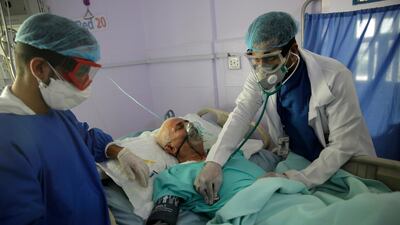Countries in the Middle East and North Africa (Mena) must invest more in their people's skills and harness their productivity to drive economic growth as the Covid-19 pandemic presents opportunities for improvement, according to the World Bank.
From education reforms to addressing gender gaps, countries in the region should invest more effectively in developing human capital – the knowledge, skills, and health that people accumulate over their lifetime, the Washington-based lender said in its 2020 Human Capital Index report.
"As the Covid-19 pandemic risks undoing the fragile progress that has been achieved in human capital outcomes, Mena countries must do more to improve the effectiveness and efficiency of their investments in people," Ferid Belhaj, the World Bank's vice president for Mena, said.
The Covid-19 crisis has disrupted health and education systems around the world as governments look to balance protecting people from the virus and reviving their economies. The pandemic risks wiping out gains made in education and health globally over the past decade, particularly in poorer nations, the World Bank said in an earlier report.
The crisis has plunged the global economy into the deepest recession since the 1930s, hampered international trade, paralysed air travel and disrupted people's daily lives.
The outlook remains grim even as governments and multilateral lenders continue to prop economies through loans, grants and financial rescue packages. The International Monetary Fund forecasts the world economy will contract 4.9 per cent this year while the World Bank estimates it is likely to shrink 5.2 per cent.
The World Bank’s Human Capital Index captures the average amount of human capital a child born today is expected to accumulate by the time they turn 18 years old. It takes into account mortality rates, years of schooling and academic test scores, among other indicators.
The 2020 index calculates the expected productivity of future workers, providing a snapshot of human capital right up to the beginning of the Covid-19 pandemic.
A child born today in Mena will only be 57 per cent as productive when they grow up as they might be if they benefited from complete education and full health, the World Bank cautioned.
The 2020 index includes health and education data for 174 countries – covering 98 per cent of the world’s population – up to March 2020, providing a pre-pandemic baseline on the health and education of children.
Capitalising on existing human capital is a "major concern" in the region, with countries failing to use the skills and productivity of large proportions of their populations to drive economic growth, the report showed.
In Mena, the average Human Capital Index value declined by more than a third when accounting for the proportion of the working-age population who are employed.
Mena countries, particularly Gulf states, have the world’s largest gender gap in utilising human capital, due to low labour force participation among women, especially those without tertiary education, the report said. High youth unemployment rates contribute to under-utilisation of human capital in many parts of the region.
Gender gaps remain wide in some Mena countries where the Human Capital Index for males (0.55) is lower than that for females (0.59). These differences are driven largely by education.
Mena countries varied substantially in their human capital scores, depending on each nation's income levels, exposure to fragility and afflictions of conflict.
Oil-rich Gulf states have higher Human Capital Index values, ranging between 0.56 and 0.67, while conflict-stricken states such as Iraq lag behind with scores of 0.41, the report showed.
Some countries – like the UAE, Morocco and Oman – have improved their Human Capital Index values over the past decade. Others – such as Jordan, Kuwait and Tunisia – have remained unchanged.
Overall, countries in Mena tend to perform below countries in other regions at the same income level on the Human Capital Index.
"Despite progress over the past decade, the findings in the 2020 Human Capital Index indicate that Mena countries could do much more to improve the state of human capital, its utilisation, and gender equality," Keiko Miwa, World Bank regional director for human development in Mena, said.
"Covid-19 presents risks but also opportunities to build back better the human capital in Mena."


